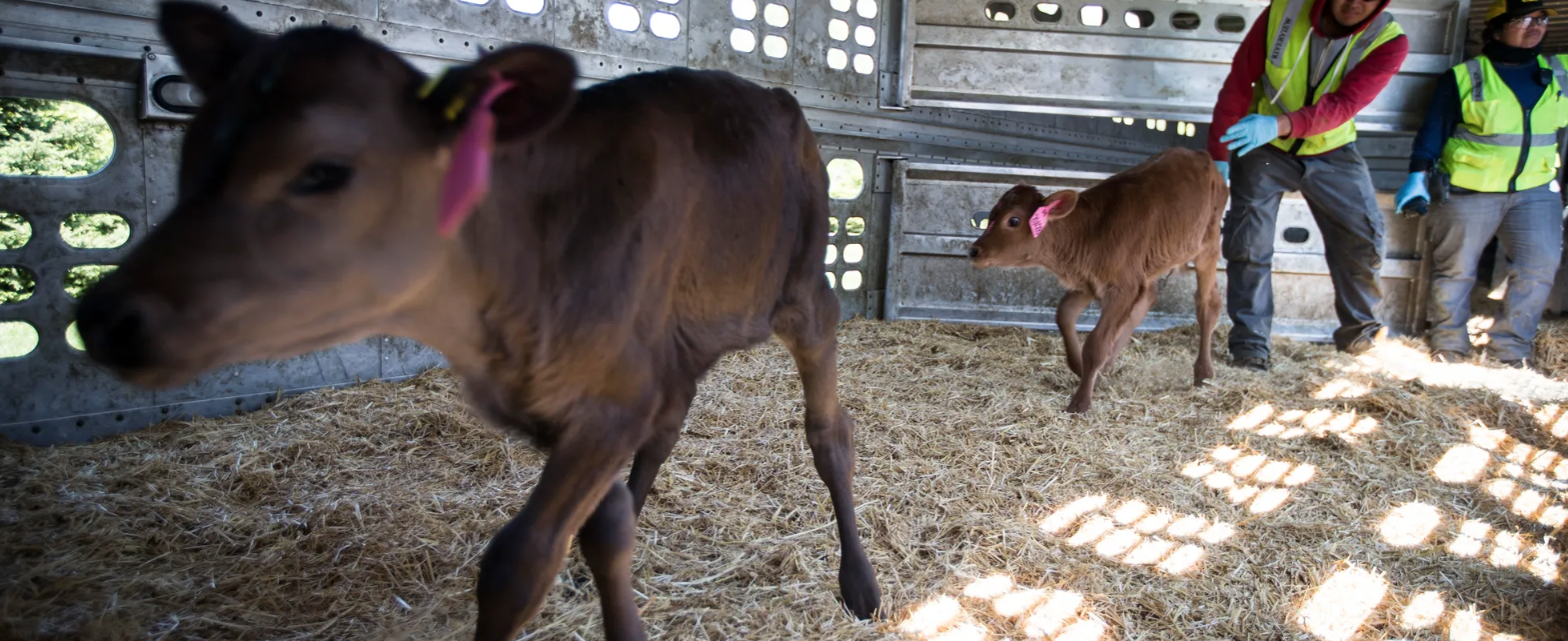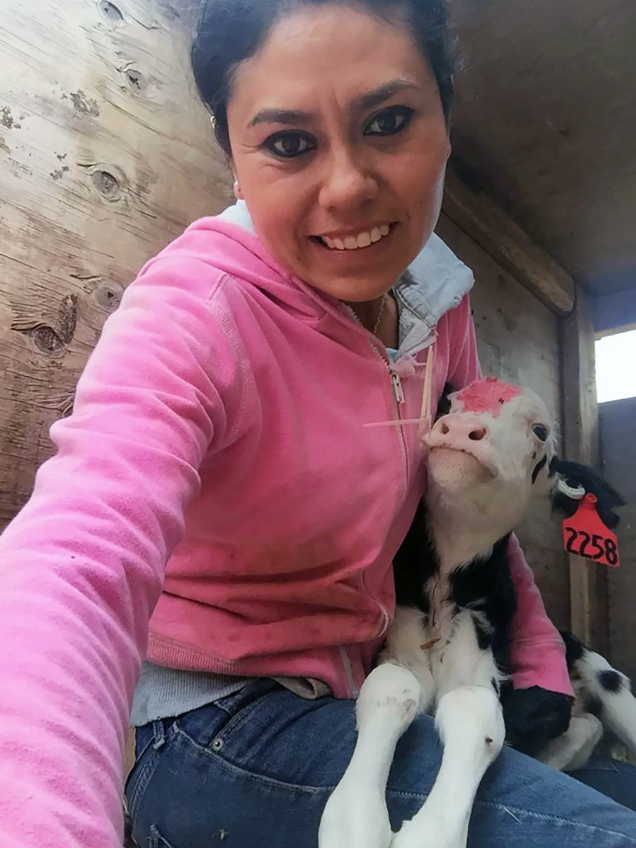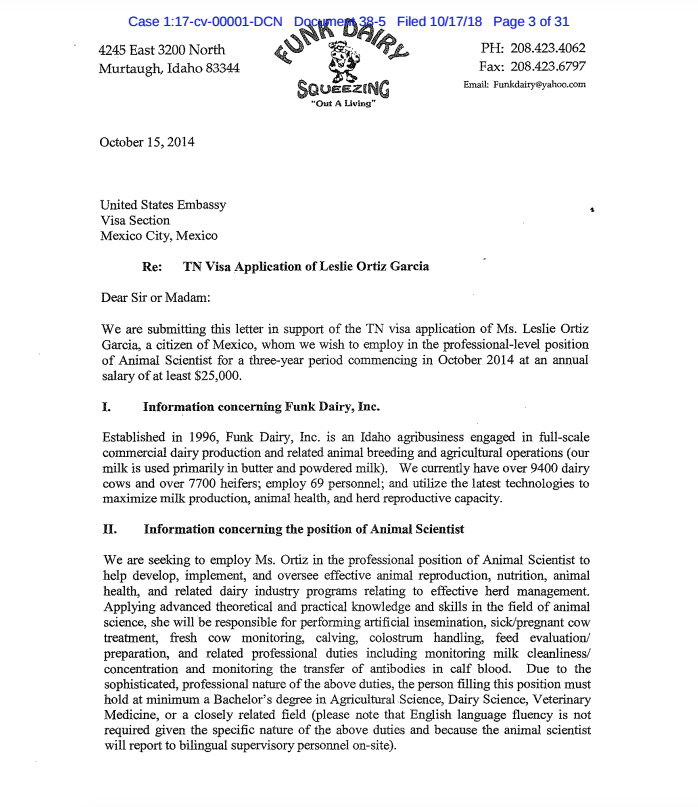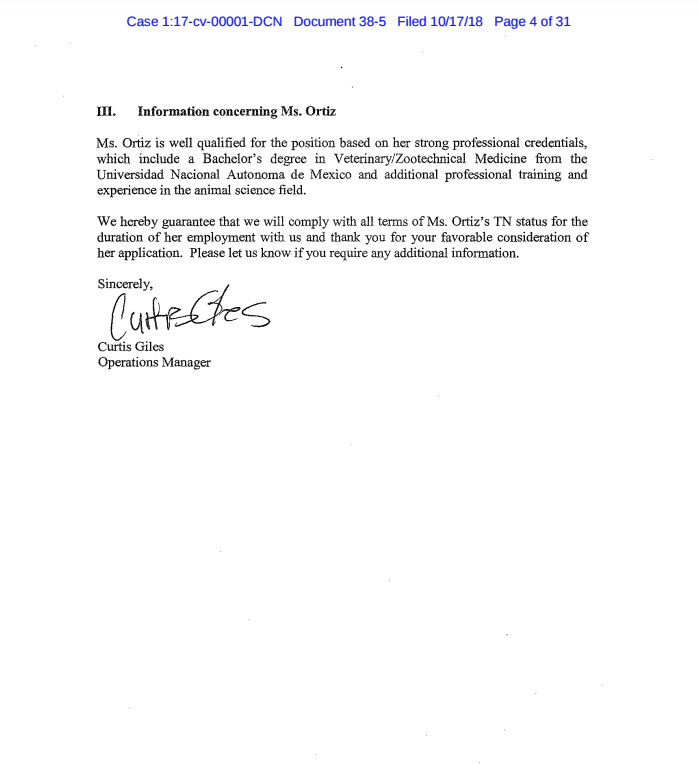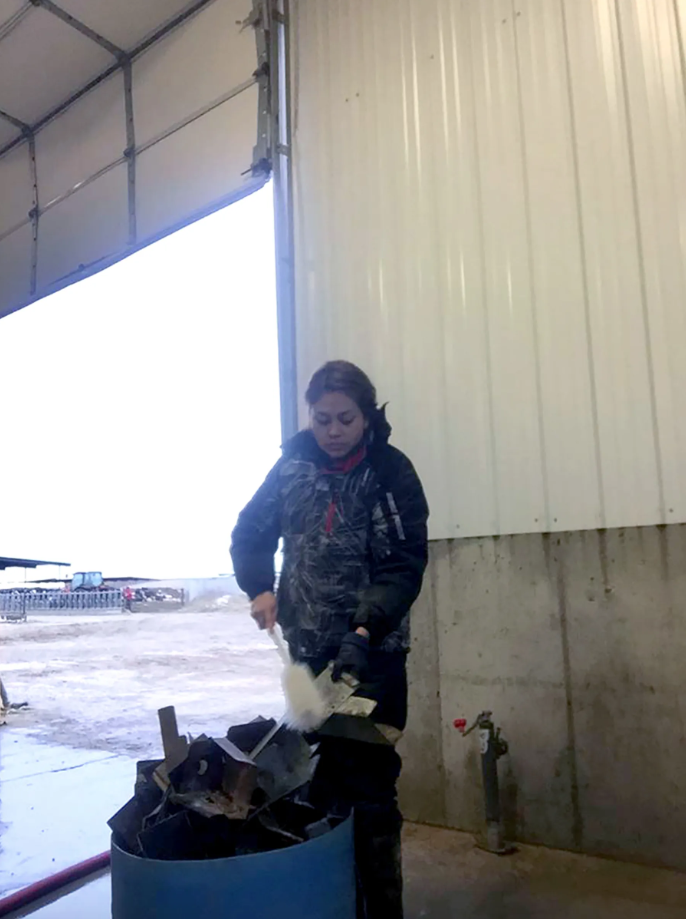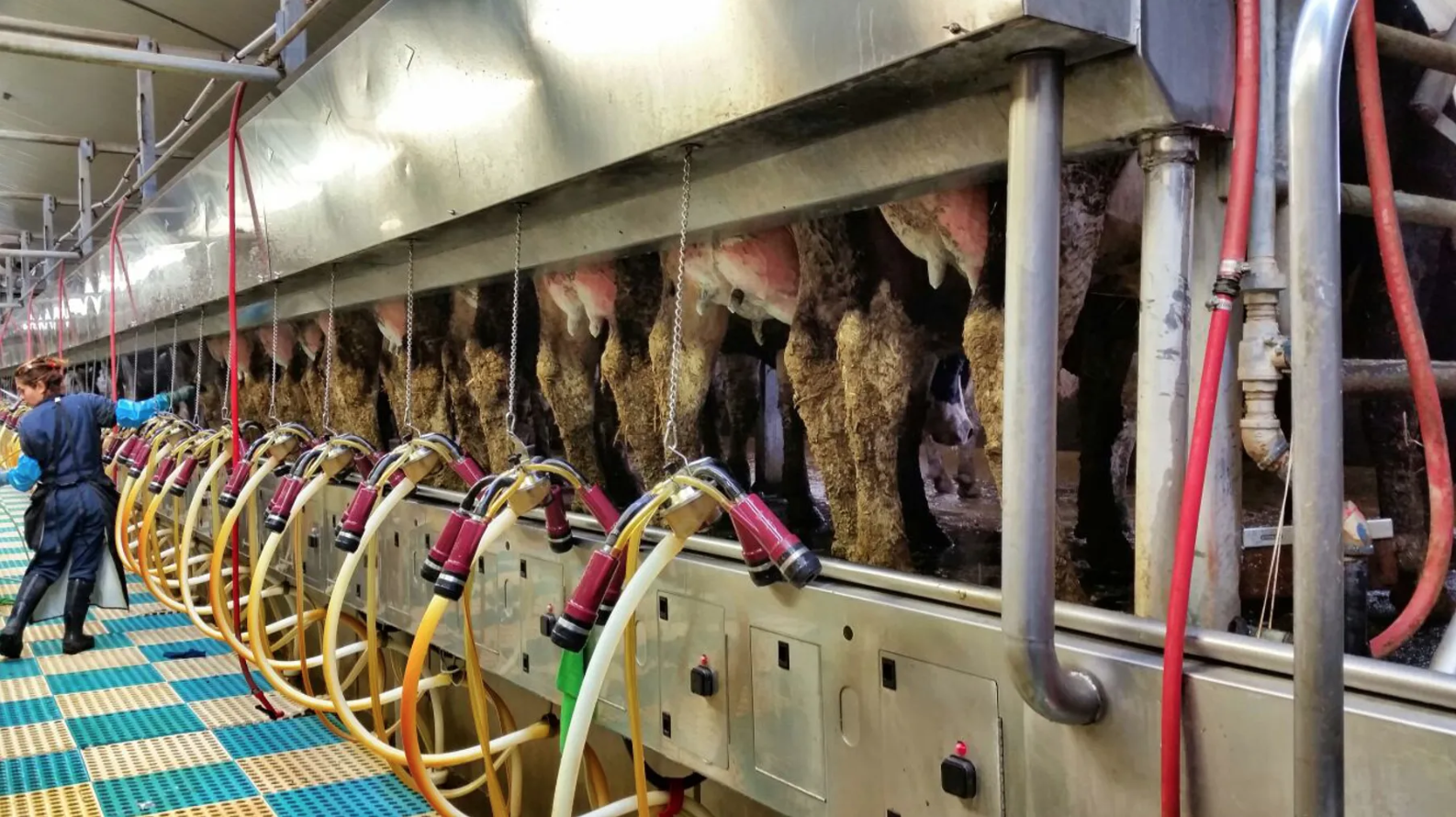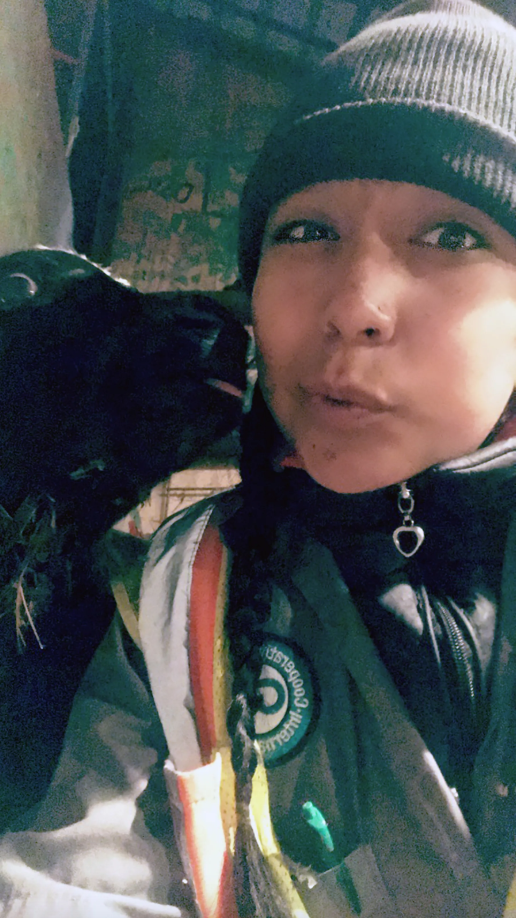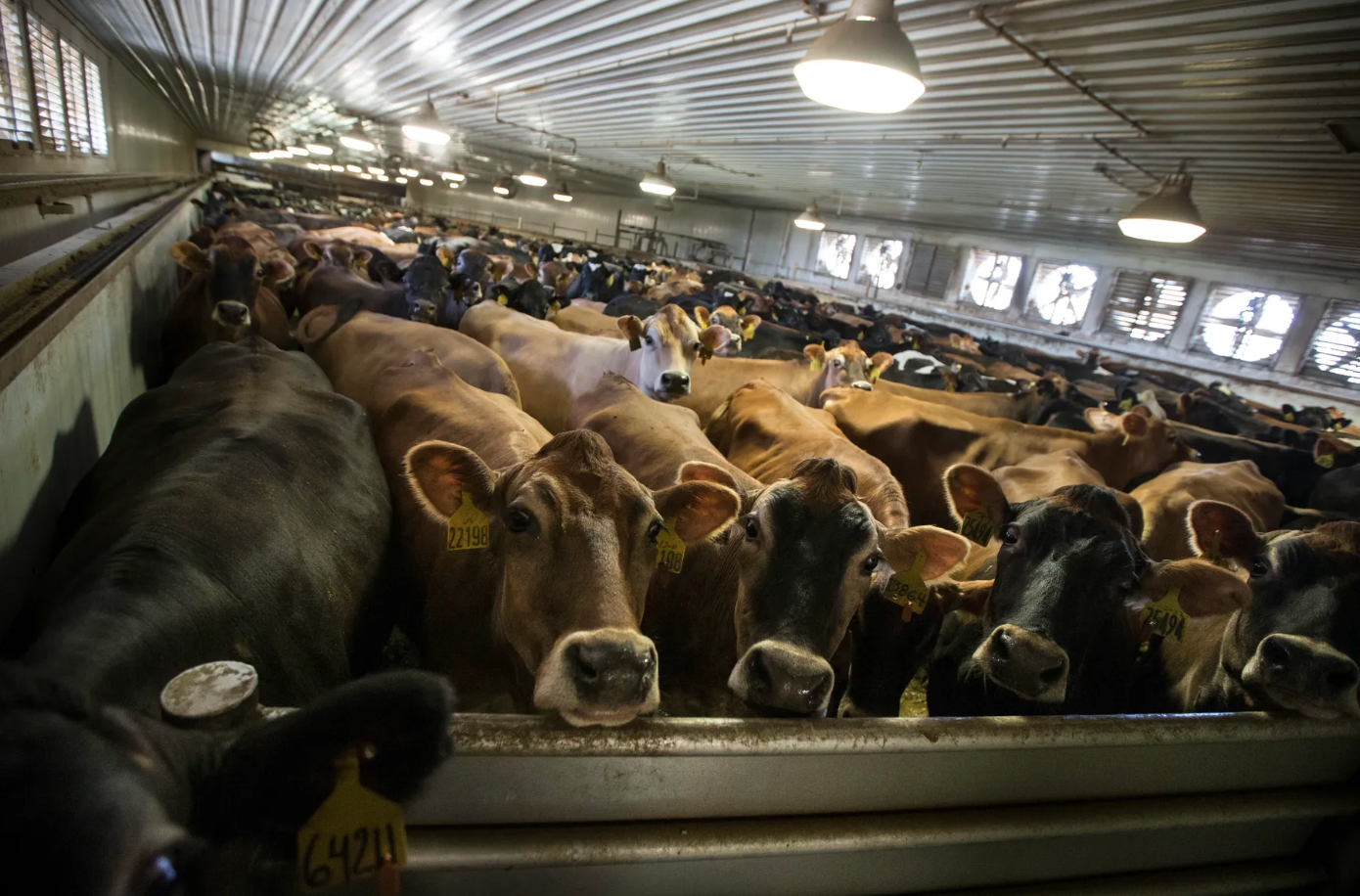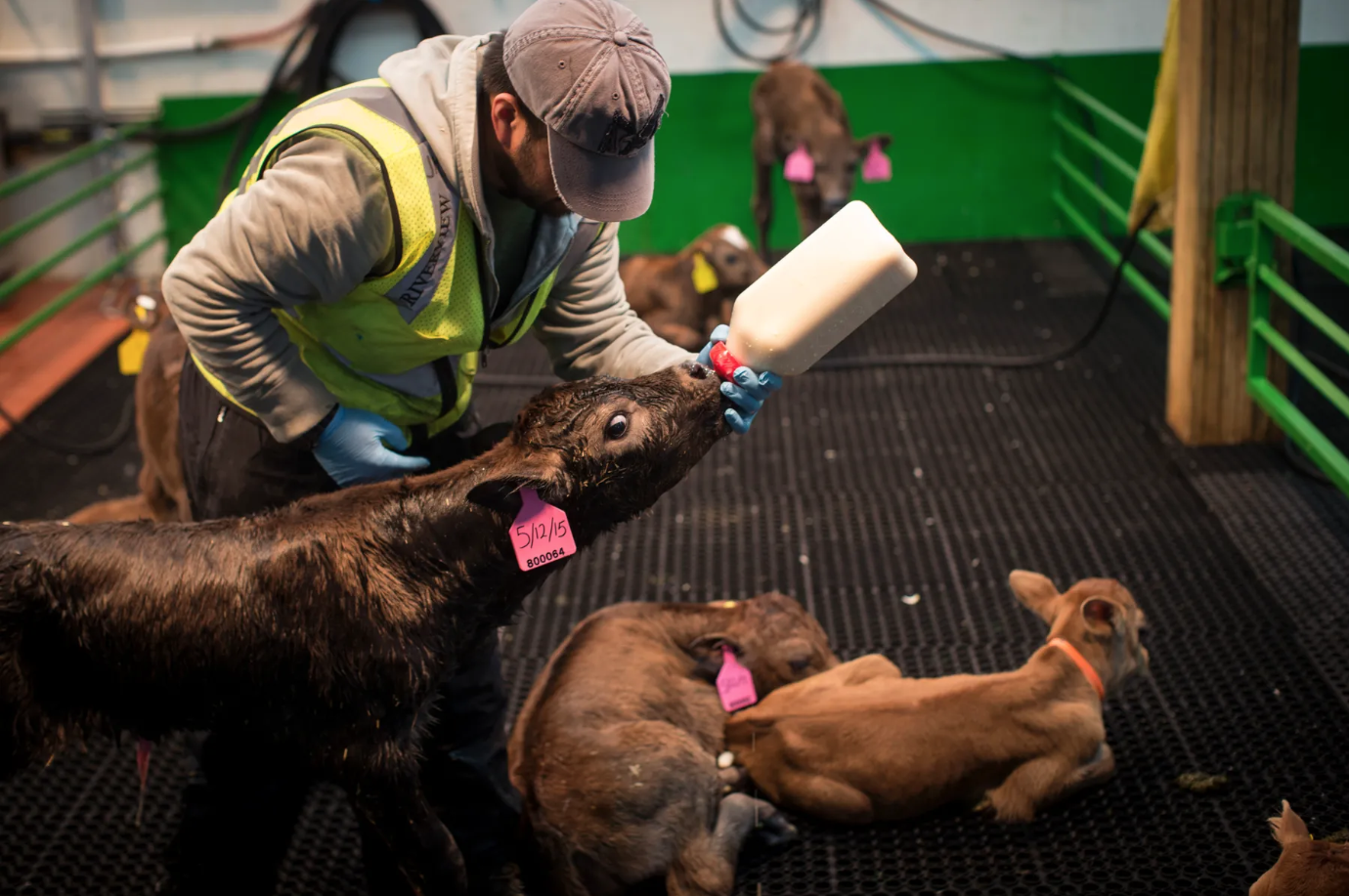Leslie Ortiz had just graduated when a recruiter arrived at her Mexico City university looking for veterinarians to work on an Idaho dairy farm.
It appeared to be an opportunity to gain experience, learn English, pay down credit card debt from her time as a student and even start to save.
The offer came with a visa — one issued through a special program for professionals from Mexico and Canada who are needed for high-skilled jobs in the U.S.
When Ortiz, then 26, learned she got the job — an animal scientist at Funk Dairy — she was thrilled. To pay for her flight to Idaho, she borrowed $150 from family and pawned her jewelry, including a gold chainlet with the image of the Virgin of Guadalupe she received on her 15th birthday.
Within weeks, she realized she had been deceived.
She was milking cows and cleaning the milking parlor 12 hours a day for $10 an hour without so much as a lunch break. She turned to pills to quell pain in her fingers, her hands, her legs. On the job, she was told over and over she had to work faster. At night, she was too tired to do much more than eat and sleep.
“I spent all day crying,” Ortiz said.
As U.S. dairy farms struggle to find low-cost workers, some are using the special visa program to lure Mexican veterinarians and engineers with offers of high-skilled jobs, but then assign them to clean barns or other menial tasks — circumventing the visa rules for work requiring a college degree.
The work can be brutal and dangerous, the shifts long, the wages low. Sometimes there are no breaks — even in a 12-hour shift — and few days off.
Ana Karen Barragán had expected to care for calves and heifers as an animal scientist at Harmony Grove Dairy in Georgia. Instead, she had to carry sacks and feed, and the shared trailer she was provided to live in was infested with cockroaches and mice.
Arturo Sánchez died in a skid loader accident just after he finished cleaning a barn at a Riverview farm in Minnesota. Supervisors knew for weeks the vehicle had a safety failure, according to state records.
Once in the U.S., some quit after a few days or a few months, disappointed or exhausted.
Others find themselves stuck. They can’t take a new job better suited to their education and skills unless another employer helps obtain government approval. They may need to earn money to recover their moving costs.
Some stay longer, even years, hoping job conditions get better, or willing to hang on for bonuses and wages that — while low — are higher than back home.
“They tell you that you are going as an animal scientist,” said Moisés Candelario, who worked at the Riverview farm. “You arrive, and they tell you to take a scraper and clean all the manure.”
The program has grown rapidly at a time the federal government has moved to restrict immigration.
Unlike some other visas, the Trade NAFTA — or TN — visa program doesn’t require businesses to first recruit Americans, pay thousands of dollars, or offer workers a prevailing wage. What’s more, the visa approval comes quickly, and there is no cap on how many can be issued.
But a lack of scrutiny leaves the program open for abuse.
Through a review of court filings, sworn depositions, offer letters, visas and interviews, the Milwaukee Journal Sentinel identified 23 Mexican university graduates who were hired by dairy and other animal farms through the program, but quickly were assigned tasks that do not require a college degree. The real number is likely vastly higher.
Most workers said they were deceived at least once, though others said they knew what was in store.
Officials at dairy farms that use the TN visa program say they followed all of its requirements and made efforts to ensure those hired knew what type of work to expect.
Kevin Wulf, an official with the farm where Sánchez died, told the Journal Sentinel he didn’t know if the company had placed workers in jobs they weren’t allowed to perform — but if the company did, he said, it was unintentional.
Joel Coble, manager at the Georgia farm, said Barragán was undergoing a training program to expose her to all aspects of the farm’s operations before her permanent assignment. Barragán said when she quit she was told nothing could be done about her tasks.
In court filings, officials from the Idaho farm said they did not deceive Ortiz or other veterinarians they brought in through the TN program.
Manager Curtis Giles stated when he talked with the recruits in Mexico, he didn’t know what specific tasks they would perform, but told them the work would be hands-on and physical.
In a deposition, Giles said he believed the workers could perform all the duties they were assigned, based on guidance from the farm’s attorney:
“The information I got from the lawyer was anything with the care and production of milk.”
Use of Program Skyrockets
TN visas were created with the implementation of NAFTA in 1994.
The idea was that skilled workers should be able to move quickly and freely between the three countries, just as barriers had been reduced to encourage more trade. The program would also help the countries quickly address labor shortages.
The number of TN visas issued to Mexicans skyrocketed after 2010, as the U.S. economy recovered from a recession, unemployment rates fell and the number of undocumented immigrants in the country declined. That year, more than 3,300 received TN visas. The number has since risen to more than 21,000.
Mexican workers seeking these visas apply directly to the U.S. Department of State. The program is limited to 63 professions, ranging from architects to industrial designers, accountants to lawyers.
The Journal Sentinel first requested information on the job classifications for the visas granted by the department, and the companies where the workers wound up, in December 2018. The State Department rejected that request in July, saying it would have to create a new record to provide the information — a decision the Journal Sentinel has appealed with the department.
Department officials have refused to answer a series of questions about the program.
Thus, it’s impossible to say how often the workers are inappropriately placed in less-skilled jobs that do not qualify for the visas. But workers, advocates and others say the practice is widespread; the Journal Sentinel’s review found cases on 12 farms in nine states.
In Wisconsin and other states, dairy farms rely heavily on immigrant workers —documented and undocumented — to survive. Some Wisconsin farmers say it has been years since they have seen an application from a U.S.-born worker.
Farms can’t bring immigrants in as seasonal guest workers for year-round jobs, such as milking cows, and sponsoring them for a green card is a lengthy process that may cost thousands of dollars.
In theory, the TN visa program offers a relatively easy way to fill farm jobs, but with one big problem: The program is only for high-skilled jobs, and most dairy jobs don’t fit that definition.
So farms are bending — even ignoring — the definition, and rolling their general hires under the “animal scientist” classification, or as “breeders.” Both are among the 63 approved professions on the TN visa list.
Helen Tarokic, an immigration attorney based in North Carolina, said for a TN visa to be appropriate, the job duties need to be related to the worker’s education. If the worker’s duties don’t match what was promised, it could constitute fraud, she said.
A handbook used by U.S. State Department officials states animal scientists typically conduct research on farm animals, develop efficient ways to produce and process milk and other food, and advise farmers on how to increase the quality and efficiency of their livestock.
“Animal scientist is not meant to be a catch-all for someone who is doing physical labor with animals,” said Kathleen C. Walker, an immigration attorney based in Texas.
Job Offer vs. Reality
In Mexico, Ortiz soon received an email saying she got the job. Giles, the farm manager, signed a letter in support of her visa application.
The Oct. 15, 2014 letter, reviewed by the Journal Sentinel, says Funk Dairy intended to hire her as an animal scientist to help develop, implement and oversee animal reproduction, nutrition, health and other programs. She would apply her “advanced theoretical and practical knowledge and skills” to tasks such as artificial insemination, cow treatment and feed evaluation.
The letter noted at least a bachelor’s degree in veterinary medicine or a related field was required “due to the sophisticated, professional nature of the above duties.”
The pay: At least $25,000 a year.
That year, the prevailing wage for an entry-level animal scientist in Twin Falls County, Idaho, where she would be working, was $53,914.
Ortiz was one of seven veterinarians from Mexico all hired in 2014 by the Idaho farm, which company records show had more than 17,000 cows and heifers at the time.
Ortiz and five of the others later filed a federal lawsuit accusing the company, Giles and farm owner David Funk of human trafficking and forced labor. In May, a judge dismissed the case, saying the allegations did not meet the legal threshold for either. The case is now on appeal.
The lawsuit — whatever the outcome — provides a window into how dairy farms are using the TN visa program to obtain workers.
The process often begins with ads on Facebook, where posts abound recruiting veterinarians and engineers to work on farms throughout the U.S.
The ads use catch phrases such as “legal employment in the U.S.” and offer 60, 70, 75 hours of work a week — sometimes for $13 an hour or more. Some ads say applicants must be under a certain age, 50 or even 38, an apparent effort to discourage those who can’t do the physical work.
Recruiters often set up information sessions and interviews at universities and hotels in Mexico.
Ortiz met Giles when he and a Mexican recruiter came to the Universidad Nacional Autonóma de México to interview graduates.
In Mexico, veterinary studies typically take five years. When students graduate, they can work as veterinarians in Mexico, but they aren’t licensed in the U.S. However, the Mexican veterinarian graduates can be hired as animal scientists.
Ortiz told the Journal Sentinel she didn’t think much about Giles not detailing what her tasks on the farm would be. After all, veterinarians know what the job involves.
Nor did she think much of a particular instruction she later received from the company’s attorney — that, if asked by U.S. consular officers reviewing her visa application, she should say the work didn’t involve milking cows.
The other veterinarians that are part of the lawsuit said they received the same instructions.
On her first day on the job, Ortiz was told to load calves into a tractor, transport them and feed them, according to a sworn statement she provided in the lawsuit. She later spent nearly three months milking cows and also worked in other areas with tasks such as washing troughs, removing manure from the feed or picking up trash. She was paid $10 an hour.
Even when she and the others worked in the birthing, veterinary or insemination areas, the lawsuit says, their work was manual labor, not professional. In payroll records and reviews, the workers were classified as “outside help,” “calves,” “feeder” and “milker,” a review of the documents shows.
In January 2015, about a month after they arrived in Idaho, Ortiz and the others emailed a letter protesting their work conditions to the Mexican contact who helped with the recruiting, Mario Mercado.
“We were never told or mentioned the type of tasks that we would perform with exactitude,” the letter read in Spanish. “The only thing that we were told in those interviews was the general movement of the different farm areas, but never that we would perform tasks of a general laborer, in few words, they needed workforce.”
Mercado responded that he would talk with Giles, the manager, but the type of work never changed.
In an interview, Ortiz said during the 12-hour workdays in the milking parlor, they couldn’t stop — even to eat. Sometimes, she said, bits of manure would fall in their food.
“If you wanted to eat something, you had to eat standing, with all the dirt,” she said.
Another worker, also on a TN visa as an animal scientist, lost the tip of her right index finger after an accident while she was helping milk a cow. The lawsuit claims more than an hour was wasted as another worker drove her to a hospital, then was ordered to turn around and take her to a cheaper one.
Workers said the portable toilets they had to use were dirty and so far away from some work areas that employees had to drive to them. Some used calves’ pens or buckets instead.
They said they were promised free transportation and housing, but had to buy cars and pay rent. One was placed in a basement unit that had no heat and was infested with rats and spiders.
Some of the workers say they reported the matter to the U.S. Department of Labor, but didn’t get help. In February 2016, the workers and an attorney contacted the Department of Homeland Security, which includes U.S. Immigration and Customs Enforcement and investigates cross-border criminal activity, such as human trafficking and visa fraud.
An investigator described a Funk Dairy basement unit as a “substandard moldy icebox.”
But the department, which investigated the company for visa fraud and inducing a foreigner to enter the U.S. in violation of the law, closed the case in May 2016, after determining it could not prosecute the case criminally.
An ICE spokeswoman didn’t respond to questions about why the case was closed, or about the number of complaints received and cases opened related to the TN visa program.
Lawsuit Alleges Misuse of Program
Seven months later — after each of the six had been fired or quit — the workers filed the federal lawsuit, arguing the company never planned to have them do the work that had been promised.
The lawsuit alleged the workers had been promised reimbursement for their travel costs, and a return ticket to Mexico, a $2,000 bonus and a week of paid vacation if they stayed for a year, but only got the bonus and the vacation.
Once here, the lawsuit says, the workers couldn’t quit until they had saved enough money to return to Mexico.
“Plaintiffs continued to work for Defendants in hopes of obtaining means to return home and some reward for their hard work,” a court filing said.
The Funk Dairy hires came in the wake of a 2012 audit by Immigration and Customs Enforcement — ICE — that found three quarters of the farm’s 73 employees where undocumented immigrants. In April 2013, the company told ICE it had fired them.
Around that time, Giles first heard of the TN program at a conference, according to his deposition in the lawsuit. Later he traveled to Mexico seeking workers, with the help of a contact he made through Milk Source, a large Wisconsin-based dairy farm.
In the lawsuit, lawyers for the workers argue Funk Dairy turned to the TN program in response to the ICE audit, and to address turnover, which court records show was more than 75% in 2015.
Funk Dairy’s operations manager said after the audit the farm tried to improve its hiring procedures to obtain a “legal work force,” according to an ICE report filed in the case.
Yet in its response to the lawsuit, the company said Ortiz and the other veterinarians were hired to increase the quality of the workforce, not to resolve issues related to retention or a lack of workers.
In his deposition, Giles — the manager — acknowledged none of the veterinarians from Mexico were performing any tasks other employees weren’t doing. He also said he didn’t think the farm required college degrees for any of its other workers.
He said the farm’s attorney, Jeremy Pittard, told him TN workers could work in anything related to animal care and milk production. Pittard didn’t respond to phone calls and an email seeking an interview. Funk Dairy referred the Journal Sentinel to a separate attorney representing the farm in the federal lawsuit, but he didn’t respond to interview requests.
In court filings, the company said each worker performed one or more of the tasks mentioned in the letters in support of their visa applications and denied the various accusations from Ortiz and the others.
For instance, Giles said they only promised free housing and transportation for the first few weeks, and turned the case of the worker who lost her fingertip over to worker’s compensation.
The company stated that the workers were free to quit at any time, and when Giles told three of the workers he wasn’t continuing their employment, they were upset.
“This is simply a case of disgruntled, at-will employees dissatisfied that their work relationship with Funk Dairy was not successful,” a court filing says.
Charlotte Mikat-Stevens, the attorney for the workers, said stronger government oversight of the TN program and new regulations protecting workers are needed to avoid abuses.
“The importance of this case is to highlight these issues, show the courts and the public what’s going on and to stop other employers and recruiters from doing that, from taking advantage of other prospective foreign workers,” she said.
Few Pursue Claims in Court
Even when Mexican workers are misled, or think their employers didn’t abide by their promises, they usually either stay on the job or leave without turning to the courts.
In Wisconsin, two Mexican veterinarians reached a confidential settlement in 2018 with a farm that recruited them as animal scientists, but assigned them menial work, according to a Legal Action of Wisconsin statement. The case never reached the courts.
In New York state, John Marsella, senior staff attorney at the Worker Justice Center of New York, said he has talked with a few workers who came on TN visas to New York dairy farms but then were treated as general laborers. None of them took legal action.
Barragán did not take legal action either.
She went to work at Harmony Grove Dairy Farm in Georgia, which had been profiled in a Dairy Farmers of America publication as a 2016 “member of distinction.”
The article talked about the challenges of growing quickly into a 2,500-cow farm and finding employees, noting competition for workers in the area from large construction projects and a thriving logging business.
“It is difficult to hire someone, to train them to do the job, and then they will leave and go work for another employer who pays more money,” James Coble, a manager, was quoted as saying. James and Joel Coble are brothers.
Two months before Barragán — who had a veterinary medicine degree — arrived at the farm, a recruiter sent her an email with a list of job duties that included scheduling vaccinations, taking charge of the health of heifers, breeding and heat detection.
But Barragán told the Journal Sentinel when she arrived at the farm, she was put to work cleaning pens and carrying heavy sacks, animal feed and bottles to feed the calves — even boxes of soda.
She said she rarely injected antibiotics into animals; that work was primarily done by someone else.
She says she worked 12 to 16 hours a day, with a weekly salary of $692. That amounted to between $7.20 and $9.60 an hour.
In the trailer she rented with a co-worker through a deduction in her paycheck, the heat didn’t work and cockroaches and mice wandered around.
“I couldn’t sleep in fear that mice would climb in the bed, the cockroaches on my face,” she said.
She says she told her recruiter about the job duties and living conditions right away. She was told to put up with it and wait for the house to be fixed “little by little.”
Instead, Barragán returned to Mexico after four days.
In a statement to the Journal Sentinel, Joel Coble said Barragán was taking part in an orientation period consistent for all new employees.
“Regretfully, Ms. Barragán did not remain employed with our farm long enough to fulfill the proper training that would have prepared her for the more technical parts of her job such as vaccinating animals, record keeping or treating animals,” the statement said.
Before she arrived in Georgia, Barragán said she spent about a month working on a dairy farm in New Mexico, while being paid by Harmony Grove. The relationship between the two farms is unclear, but Barragán said she was told it was a training period.
In New Mexico, she said, she was in charge of the health of 1,200 calves, doing lab tests, conducting animal necropsies, training staff and writing medical protocols.
Coble noted the farm paid travel expenses, among other costs, to bring Barragán to the U.S.
“We believe that we were cooperating fully with our expectations as employers in the TN Visa program,” the statement said.
Nevertheless, the farm stopped using the visa program after three employees left in a short period of time, according to Coble.
Evy Peña, spokeswoman for Centro de los Derechos del Migrante, a joint U.S./Mexican group that advocates for migrant rights, said she could not comment on Barragán’s case specifically, but said she has heard the training justification more than once.
“They would tell workers they are in training, but the training lasts for months and never ends,” she said.
Oversight Is Lax
For many employment-based visas, the Department of Labor is required to vet the jobs offered to make sure the work is appropriate and that businesses aren’t trying to drive down wages. For agricultural workers on seasonal visas, states are required to inspect employer-provided housing.
None of that is required with the TN program, which for Mexico is run mainly through the State Department.
According to the department’s Foreign Affairs Manual, which includes guidelines for the TN program, U.S. consular officers should verify that the proposed salary tied to a visa is indicative of professional-level employment.
The Journal Sentinel reviewed nine letters for people hired as animal scientists on TN visas. Time and again, State Department officials approved visas in cases where companies offered $25,000 or $30,000 salaries to animal scientists.
That’s 25% to 50% less than the prevailing entry-level wage in the counties where they were hired to work, a Journal Sentinel found.
For instance, in Twin Falls County Idaho, the prevailing wage for animal scientists was $25.92 an hour, but the Funk Dairy workers were making about $10 an hour.
By definition, the jobs were to involve skilled work, but the pay was only 31 cents higher than the mean wage for farm workers in the area, 5 cents more than housekeepers and $2.14 less than receptionists, according to estimates from the U.S. Bureau of Labor Statistics for May 2014.
Peña, with the migrant rights group, said one of the problems is consular officers are approving TN visas even if letters of employment broadly define the tasks. That makes it easier for the job to be misrepresented.
Peña said if the State Department posted a database of employers and job offers, it would be easier for applicants to compare offers and find new employers if they are being abused.
She argues the Department of Labor should have oversight of the program.
“By expanding guest worker programs without strengthening workers’ protections you are creating a recipe for worker exploitation,” she said.
Tarokic, the North Carolina lawyer, said she would leave the program unchanged and instead favors stronger enforcement to catch companies that are abusing it and more resources and better training at the consulates where the applications are reviewed.
“Consular officers have minutes to make these determinations,” Tarokic said.
‘We Had to Keep Running’
Claudio Sánchez wasn’t surprised when his brother, Arturo, went to school to become a veterinarian.
Arturo always liked animals. As a child, if Arturo saw a small dog, he would take him home and give him food.
It was that love — and a veterinarian’s degree — that brought Arturo Sánchez to West River Dairy farm in Morris, Minn. The farm is part of Riverview, which has dairy operations in five states.
In 2016, the company had over $250 million in revenue, more than 100,000 dairy animals and more than 800 employees, records show. In 2017 and 2018, it opened additional locations, with a company promotional video in late 2018 boasting of more than 1,000 workers.
The farm has supplied milk to processors such as the First District Association, which produces cheese and dairy ingredients, and Valley Queen, which has produced cheese for Kraft Foods.
A company representative declined to tell the Journal Sentinel how many workers on TN visas it employs, but a Journal Sentinel review of three years of data on applications used by Riverview to start the process to sponsor employees for green cards showed at least 171 of those workers were brought in on TN visas.
Meanwhile, a 2014 article in a local newspaper in Minnesota quoted a company representative as saying most of the farm’s Hispanic employees were on TN visas.
Riverview is actively recruiting more TN workers, with Facebook ads that tout company slogans such as “be kind” and “be safe.”
The Journal Sentinel spoke with eight former Riverview employees who worked for the company between 2011 and 2018, each of whom provided photos of TN visas they received that promised work as animal scientists, breeders or engineers.
Each said they were put to work cleaning manure in the barns or performing other tasks that don’t require college degrees — a practice they said was widespread. They also said workers were pressed to rush through their assignments.
Arturo Sánchez’s job involved cleaning some areas, milking cows with mastitis infections whose milk couldn’t be sold, pushing feed closer to cows and marking cows that were on a list because they were close to giving birth, according to Edson Medina, a co-worker who also was on a TN visa.
At about 2:30 a.m. on July 31, 2016, Sánchez had just finished using a skid loader to clean manure from an alleyway in a barn at the West River Dairy facility, and was likely opening a gate to return cows to the feeding area — a task he performed every shift.
The coroner concluded Sánchez stretched part of his body out of the loader’s cabin to open the gate. Sánchez likely pushed a pedal with his foot, which lowered the arm of the skid steer, pinning him against the vehicle’s operator cage. He died immediately.
The vehicles include a safety bar that lowers to cross the driver’s waist. When the bar is raised, the arm of the vehicle can't be operated. Weeks earlier, the safety bar had been identified as broken, a supervisor told inspectors from the Minnesota Department of Labor and Industry.
If the safety bar had been working, the arm wouldn’t have come down even if Sánchez pushed a pedal.
Medina was cleaning manure in other barns during the shift when Sánchez died. When Medina found Sánchez, his body was pinned under the skid loader’s arm.
Medina freed Sánchez, but there was nothing more that could be done.
The company was fined $25,000 for allowing workers to use the vehicle with an inoperative safety bar.
Medina said Sánchez probably tried to open the gates from inside the skid loader “because of the pressure that we were short of time.”
After Sánchez died, Medina said, the company became more strict about safety. It required workers to use seat belts and wear helmets, and supervisors told them to not rush. But the workload didn’t diminish.
“We had to keep running the same,” Medina said.
It was not the first time Riverview didn’t comply with safety standards.
After a Mexican worker died in a 2011 ATV accident, the company was fined for not providing the worker a helmet or training to use the vehicle, and not reporting the death to occupational safety authorities within eight hours.
In 2016, after a worker who had an ID card from Honduras died in New Mexico, the company was fined for not ensuring that employees used seat belts while operating tractors and that only the operator rode in the tractor.
Kevin Wulf, in charge of community relations at Riverview, told the Journal Sentinel he didn’t know if any of their workers in the TN visa program were doing work they shouldn’t have.
“I’m not gonna say we never misused it, but it has never been intentionally,” he said.
Wulf said the company works to make sure job candidates know what the work will involve. Worker’s pay, he said, is in compliance with visa regulations.
He said the company is constantly reviewing its labor allocations to make sure tasks can be performed without rushing.
“We are all working together to help everyone get home safely,” he said.
Mario Canizal, a former Riverview worker who was on a TN visa, said Sánchez told him he wanted to quit. But he stayed.
“He said he was going to return to Mexico,” Canizal said. “But I think it weighed more — his eagerness to get ahead.”
Claudio Sánchez said his brother felt Morris was a safe place and said the company was helping Arturo bring his wife and children legally to the U.S.
“As a father, work may be difficult, but you do anything for your family,” he said.
For this story, reporter Maria Perez of the Journal Sentinel staff interviewed immigrants in Spanish and translated their words into English.
